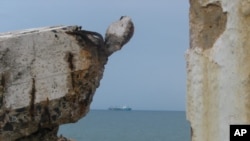Human rights organizations and other monitoring groups are keeping close tabs on frameworks to manage oil revenues in several African countries that are hoping to become major petroleum producers. The newcomers to an often opaque and corrupt sector of Africa's economy include Sao Tome, Ghana and Uganda.
New York-based Human Rights Watch is pressing the new government in the tiny West African country Sao Tome and Principe to pursue a better legal framework on oil-related revenues.
Iain Levine oversees the organization's research, including a report issued this week called "An Uncertain Future: Oil Contracts and Stalled Reform in Sao Tome and Principe."
"The important thing is to maintain the pressure, make the government realize that even though it is a small country and it is a long way away from Western media and so on, that there is a genuine concern about this issue. The government does have a law on transparency in terms of managing the oil sector, which is important. It created a series of institutions. But what has been lacking up to now is political will," he said.
Sao Tome and Principe is no longer part of the Extractive Industries Transparency Initiative, which seeks to improve transparency on company payments and government revenues from oil, gas and mining.
Analysts are concerned about signature bonus payments for oil exploration in Sao Tome's waters and the business practices of companies working with the Sao Tome government.
Another New York-based organization, Revenue Watch Institute, is monitoring the growing oil sector in nearby Ghana.
Although encouraged by a new oil revenue bill that was introduced in Ghana's parliament, Revenue Watch's Deputy Director Antoine Heuty says the country faces several major problems. "The latest one has been the questions regarding the contract between Kosmos and Exxon, and the sort of uncertainty regarding these awards of contract. It is not creating a good environment for the country, so that is one issue. The other, where we feel that the country should do much better, is that the country is not disclosing its contracts. So that is also creating opportunities for shady deals and for deals that are not following the international best practices. So clearly there are many areas where Ghana has a lot of work in front of itself," he said.
Oil analysts say Western foreign investment in Ghana might suffer after U.S.-based Kosmos Energy canceled a deal this month to sell its stake in an offshore oil project to ExxonMobil, amid efforts by Ghana's state-owned oil company to purchase the interest with Chinese backing. Government officials denied that they were discouraging foreign investment in Ghana.
Meanwhile officials in the east African country of Uganda say they hope to start work on their own oil revenue bill soon, but they are dealing with tax disputes over the sale of exploration blocks in the Lake Albert basin.
Iain Levine of Human Rights Watch says African legislators and governments should look to Norway as an example of how to manage oil revenues.
"One is that they have not just spent the money, but they have saved the money to survive through bad times, so you have got responsible management in that sense. But the critical issue here is processes of transparency, and oversight and accountability to the population, which ensures honesty and good decision making," he said.
An African example of how to manage resource money, Levine says, is Botswana's diamond industry, which has raised living standards across the country and improved government services.
But international monitoring groups warn that most resource driven economies in many parts of Africa so far have been marked by large-scale corruption, endemic poverty and repeated unrest.
Analysts Monitor New African Oil States for Corruption




